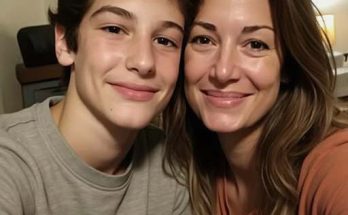A Rainy Night in Madrid: How One Meal Changed the Fate of Thousands
It was a rainy October night in Madrid. Inside an opulent restaurant tucked along Calle de Alcalá, renowned fashion designer Carmen Vega sat alone, elegantly dressed in a tailored black coat that shimmered under the dim lights. Her table was filled with untouched gourmet dishes, the chef’s latest creations meant to dazzle. But Carmen was lost in thought, her eyes fixed on the reflections of raindrops racing down the window beside her. She had built an empire of style and glamour, yet the silence in her heart was louder than the chatter around her. She had everything—money, fame, influence—but peace had long eluded her.
Just as the waiter brought out a delicate crème brûlée, a small figure appeared at the entrance. Soaking wet and trembling from the cold, a girl of no more than ten stood barefoot, her clothes ragged and clinging to her frail frame. Her name was Lucía. She didn’t beg. She didn’t plead. She simply asked, “Are you going to eat that?”—her gaze fixed on the untouched plate at Carmen’s table.
The restaurant fell silent. Diners exchanged uncomfortable glances. A waiter rushed forward to escort Lucía out, whispering apologies. But Carmen stood. Her voice, firm yet warm, stopped the commotion. “She’s my guest,” she said.
Ignoring gasps and glares, Carmen invited Lucía to sit. She ordered warm soup, bread, and hot chocolate. As Lucía ate, her eyes filled with tears—not from the food, but from being seen. Truly seen.
Between cautious sips and broken words, Lucía shared her story. Orphaned at seven after a fire took her home and parents. Abused in the foster system. Forgotten by the world. Carmen listened, stunned. The polished world she lived in felt meaningless in that moment. Something deeper stirred within her.
That night, Carmen took Lucía home. She offered her a hot bath, clean pajamas, and a bed with lavender-scented sheets. Yet Lucía, overwhelmed by kindness she didn’t believe she deserved, vanished before sunrise. A note was left on the pillow: “Thank you, but I don’t belong in places like this.”
Carmen refused to lose her. She halted fashion shows, cleared her calendar, and launched a citywide search. Posters, radio announcements, and discreet inquiries filled the streets. Days passed. Then, at Atocha train station, Carmen found her—huddled behind a bench, feverish and unconscious. Carmen wrapped her in her designer coat and whispered, “You are the most precious thing I’ve ever known.”
Lucía recovered. And this time, she stayed.
Carmen adopted her within the year. But it didn’t stop there. Inspired by Lucía’s resilience and the countless invisible children like her, Carmen founded the Lucía Vega Foundation, dedicated to helping homeless and abused children across Europe. She transformed her fashion headquarters into a shelter, auctioned her couture dresses, and began building community centers that offered food, therapy, education, and love.
Despite the new life, Lucía struggled with self-worth. “I don’t want to be your charity case,” she once told Carmen.
Carmen knelt before her, took her hand, and replied, “You didn’t ruin my life, Lucía. You gave it meaning. You didn’t need me—I needed you.”
On Lucía’s 13th birthday, Carmen gathered donors, press, and friends for what they thought was a gala. Instead, Carmen shocked the world: she pledged half her fortune—one billion euros—to the foundation, ensuring its mission would live far beyond her lifetime.
By 14, Lucía was speaking at global conferences, standing beside politicians and human rights leaders. At the opening of the foundation’s 50th shelter, she delivered a speech that moved even the most hardened hearts. “I was a number,” she said. “A street kid. Now I’m a name, a story—and so are thousands of others. Because one woman saw me, listened to me, and chose love.”
That evening, Carmen and Lucía returned to the same restaurant where their journey began. Their reserved table near the window had become legendary in Madrid.
As they sipped tea, a little girl with tangled hair and oversized shoes stepped hesitantly toward them. She looked exactly like Lucía had that night—wet, tired, hungry.
Lucía stood without hesitation. “Hi,” she said, “I’m Lucía. Are you hungry?”
The girl nodded.
“Come sit with us,” Lucía smiled. “This is Carmen. She likes to share dessert.”
And just like that, history repeated itself—not with headlines or grand gestures, but with a seat at the table, an open heart, and a warm meal.



